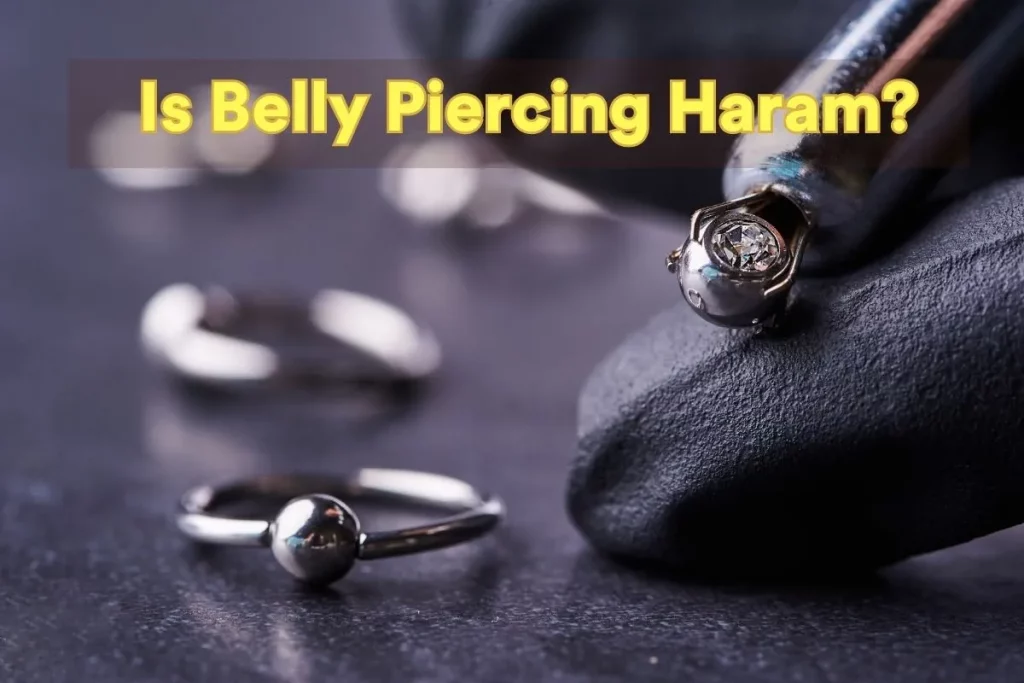Curving gracefully around the navel, belly button piercings have become a striking fashion statement for many. As body adornments continue to captivate attention, questions about their alignment with religious teachings also emerge.
In this examination, we explore the intriguing topic of whether belly piercing is deemed haram in Islam, navigating the religious perspectives and practical considerations that surround this alluring form of self-expression.
Key Takeaways
| 📌 Belly Piercing Overview |
| 📌 Islamic teachings emphasize the preservation of health and well-being, discouraging actions that pose risks or discomfort. |
| 📌 Before considering any body modification, including piercings, individuals should carefully evaluate potential risks and rewards in light of their faith and values. |
Belly Piercing: What You Need To Know
Belly button piercing, a trendy and artistic form of body adornment, involves puncturing the skin around the navel, much like other forms of body modification. The process is commonly conducted by a trained piercer who skillfully passes a sterile, hollow needle through the loose skin of the navel after marking the precise spot for the piercing.
This relatively brief procedure, usually lasting a few minutes, results in the creation of a stylish belly button piercing, akin to how individuals adorn themselves with earrings and other forms of body art.
When it comes to the sensation of pain, the level experienced during a belly button piercing is often compared to a rating of around four or five out of 10 on the pain scale. It’s important to remember that pain perception is subjective and can vary significantly from person to person, just as it does with other forms of piercing such as nipple piercing or even traditional ear piercings.
In terms of healing, belly button piercings require a patient approach, often taking up to six months to fully heal. Throughout this healing period, meticulous care is crucial. Keeping the area meticulously clean and refraining from touching it with unwashed hands is essential to prevent infection, much like the care required for any type of body piercing, be it belly button piercing, or nose piercing.
It’s noteworthy that belly button piercings demand more attention and carry more risk than common earlobe piercings due to the potential for tissue damage, infection, and scarring. Allergic reactions, especially to materials like nickel found in some piercing jewelry, are also possible concerns.
Thus, like any other body modification, whether it’s a piercing, a tattoo, or an accessory like earrings, individuals interested in belly button piercing should weigh the potential risks and rewards before deciding to proceed.
Is Belly Piercing Haram?
Yes, belly piercing is considered haram in Islam. The consensus among Islamic scholars is that altering the body through piercings, including belly piercing, is prohibited due to the potential harm it can cause and its deviation from the natural state of the body.
Islamic teachings emphasize the preservation of one’s health and well-being, and body modifications that pose risks or discomfort are discouraged.
وَأَنفِقُواْ فِي سَبِيلِ ٱللَّهِ وَلَا تُلۡقُواْ بِأَيۡدِيكُمۡ إِلَى ٱلتَّهۡلُكَةِ وَأَحۡسِنُوٓاْۚ إِنَّ ٱللَّهَ يُحِبُّ ٱلۡمُحۡسِنِينَ
“And spend of your substance in the cause of Allah, and make not your own hands contribute to (your) destruction; but do good; for Allah loves those who do good.
Additionally, Sheikh Abdul Muhsin al-Abbad’s perspective, as expressed in Syarh Abu Daud, leans towards the notion that such practices are likely prohibited. He cites two key reasons for this stance.
Firstly, such alterations could fall under the category of mutilation and harm, aligning with Islamic principles of avoiding self-inflicted pain.
Secondly, these practices are often seen as destructive rather than decorative, especially considering that they are not common among women accustomed to traditional adornments.
Final Thought
In conclusion, the practice of belly button piercing raises important considerations within the context of Islamic teachings. The ruling for such body modifications is considered haram due to their potential harm and departure from the natural state of the body.
Islam emphasizes the preservation of health and well-being, discouraging actions that pose risks or discomfort. As with any body adornment, careful evaluation of potential risks and rewards is essential before making a decision.
Allahu A’lam (Allah knows best)
FAQs
Is it a sin to get a belly piercing?
Yes, Engaging in belly piercing is considered a sin since it is regarded as prohibited in Islamic teachings.
Is belly piercing allowed for females?
No, belly piercing is not allowed for Muslim, men and women as it is considered prohibited in Islamic teachings.
Is navel piercing haram?
Yes, navel piercing is generally considered haram in Islam due to its potential harm and deviation from the natural state of the body. Islamic teachings emphasize the preservation of health and well-being, discouraging actions that pose risks or discomfort. Therefore, altering the body through piercings, including navel piercing, is often discouraged within the context of Islamic principles.
Is belly piercing harmful?
Belly button piercing can be harmful due to the following reasons:
- Infection: Belly button piercing carries a risk of infection, which can cause pain, redness, and swelling. If the piercing needle wasn’t sterile, there’s a chance you could get serious infections like hepatitis or tetanus.
- Tearing: If the jewelry catches on things, it could tear your skin. If this happens, you may need stitches.
- Allergic reaction: Allergic reactions can occur due to nickel in the jewelry.
- Nerve damage: Because of the large number of nerves and blood vessels in the navel, a misplaced piercing can cause a bloody mess and/or nerve damage.
- Mutilation of the body: Piercing is considered mutilation of the body, which is unlawful in Islam.
- Imitation of immoral people: If belly button piercing is a prevalent custom among immoral people, evildoers, or non-Muslims, then it is not permissible to adopt this custom because it is considered imitating them, and imitating evildoers is not allowed in Islam.
- Is Pop Tarts Halal? What You Need to Know - February 18, 2024
- Are Graham Crackers Halal in Islam? - January 19, 2024
- Is Keebler Wheatables Halal? - January 18, 2024





